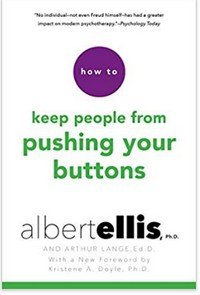
~Albert Ellis, PhD |
Dr. Ellis sometimes used vulgarity and scandalous language . . .
and was criticized by some of his peers for lack of professionalism and tarnishing the dignified image of psychiatrists, psychologists and the august institution of therapy itself. When asked if his liberal use of profanity could reduce the efficiency of REBT turning religious people away from REBT, Dr. Ellis replied:
![]() It certainly possible, but don’t forget that it is just as much or more possible that this attracts people. My language, for example, doesn’t really go specifically with REBT. When I was a psychoanalyst I used profane words. When I get up in a public meeting, which I do all of the time-I give workshops and talks throughout the world-and use obscenities I definitely turn a minority of the audience off. But I often turn the majority of sensible, bright, educated people on. And, when adolescents come to therapy against their will, because they have been delinquent or over-rebellious, I utter a few obscenities and they immediately get on my side.”
It certainly possible, but don’t forget that it is just as much or more possible that this attracts people. My language, for example, doesn’t really go specifically with REBT. When I was a psychoanalyst I used profane words. When I get up in a public meeting, which I do all of the time-I give workshops and talks throughout the world-and use obscenities I definitely turn a minority of the audience off. But I often turn the majority of sensible, bright, educated people on. And, when adolescents come to therapy against their will, because they have been delinquent or over-rebellious, I utter a few obscenities and they immediately get on my side.”
(Journal of Psychology and Christianity 1994, Vol.13, No. 4, 327-341)
In case you are new to REBT, Dr. Ellis coined the term “musterbation” to make a humorous point about our tendency to make irrational demands on ourselves, others and life in general, usually expressed by words such as should, ought and must. Get it? Shoulds, oughts and musts are troublesome enough, but when they become chronic and compulsive they can be very damaging to our mental health and destructive to our relationships with other people. In this chronic, compulsive sense, the play on words with masturbation paints a vivid analogy, much more so than using more “dignified” language to make the same point. I think it is not the demand so much as demanding that is the gremlin in our sanity.
 |
 |
 |
 |
 |
 |
 |
 |
Where or not you prefer Dr. Ellis’s style, tone and “Register,” it is important to keep in mind that his choice of language was not haphazard. He used such language for a reason and with full understanding of it’s impact, positive and negative. Certainly with the advent of the internet and social media, this discussion is much less relevant that it was 50 years ago.
Share you thoughts and comments! Please help to keep our blog dynamic and organic. Comments? Agree? Disagree? How do you interpret this statement? Do you think it affects the way you practice and apply REBT-CBT?
Does Dr. Ellis’s “salty” language offend you? Do you think it enhances or diminishes REBT?
Share your thoughts in the form below because we love hearing from you!

![]()
Originally posted 2013-05-24 18:48:47.
- Baby I Need Your Lovin’ . . .Really? - Sat 27 Jul 24
- Accentuate the Rational - Fri 26 Jul 24